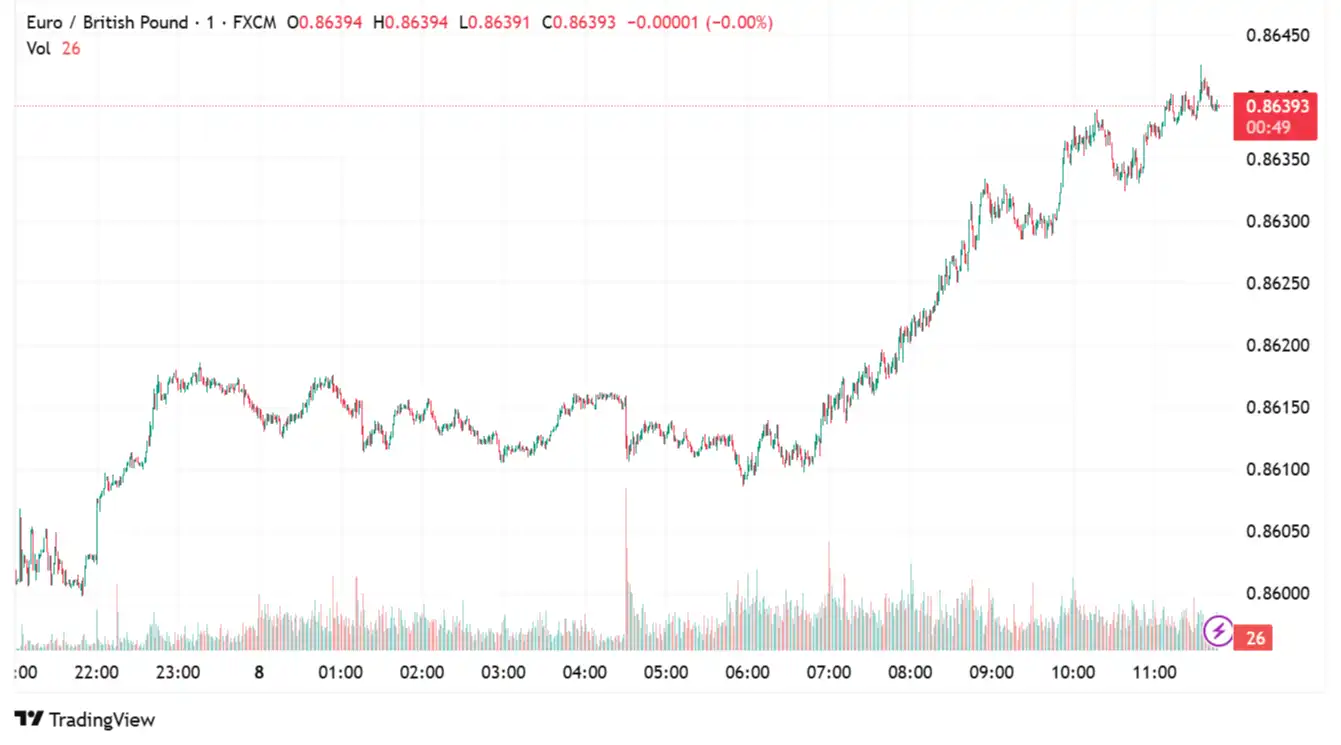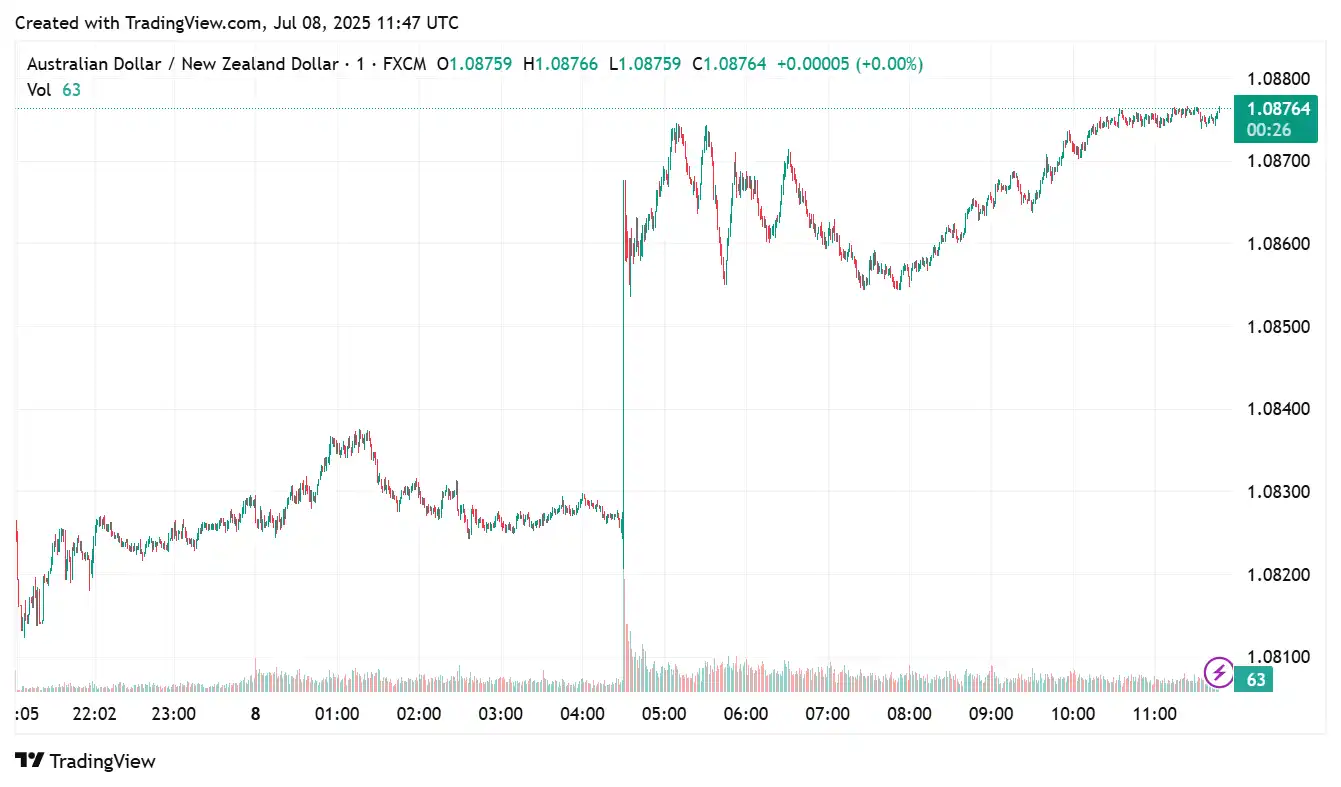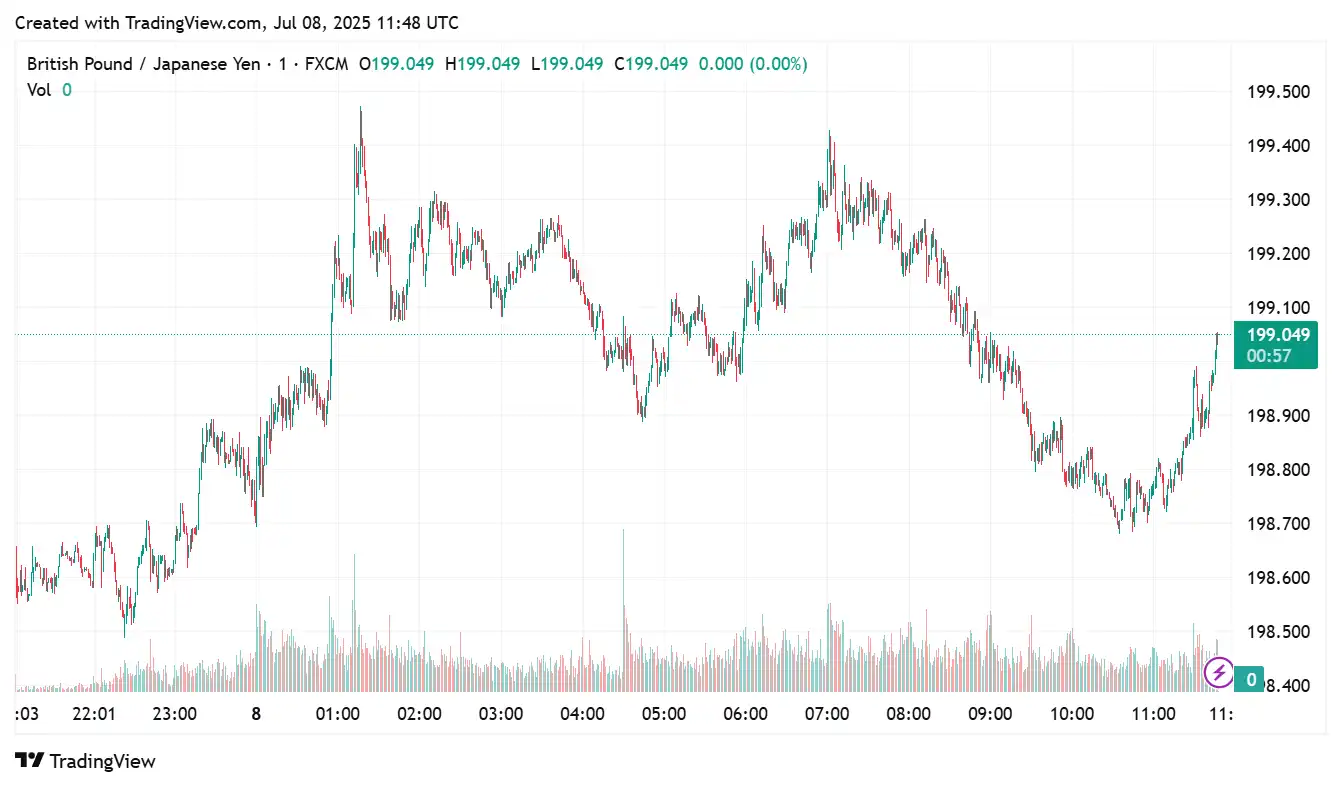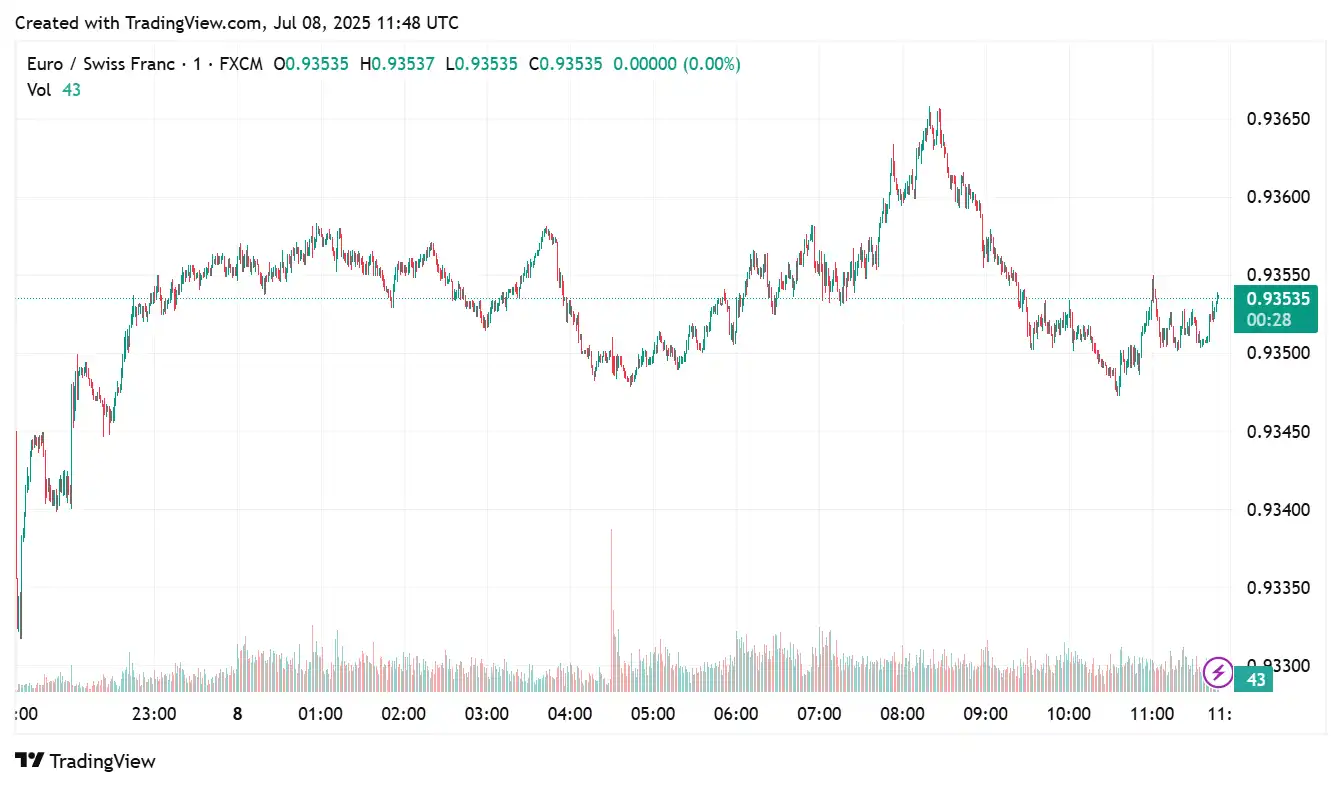EUR/GBP recovered near 0.8618 following Germany's trade balance data release, which stabilised the shared currency. The German trade surplus rose by EUR 18.4 billion in May, up from EUR 15.8 billion in April, contrary to expectations of a slight decline to EUR 15.5 billion. The main reason for these figures was a larger-than-anticipated decrease in imports, indicating slower domestic demand. On Monday, Eurozone retail sales dropped by 0.7% in May, the biggest decline in nearly two years, suggesting that US tariffs and the uncertain economic outlook in the Eurozone are beginning to impact consumer confidence. The German Statistics Office also reported on Monday that industrial production increased by 1.2% in May, defying market expectations of stagnation and following a 1.6% contraction in April. The French trade deficit hit €7.8 billion in May, an increase of €0.4 billion from the revised April figure, according to the External Trade Ministerial Statistical Office (DSECE) report issued on Tuesday. Monthly exports dropped by €0.2 billion to €48.9 billion, while imports stayed steady at €56.7 billion. Regarding trade tariffs, the Eurozone was not among the recipients of Trump's tariff letters and will not receive one for the foreseeable future, as negotiations with the US are apparently making progress and, according to market sources, a deal might be announced as early as Wednesday.
On the sterling front, growing market speculation that the Bank of England (BoE) will cut interest rates early in the August meeting, along with rising fiscal risks in the United Kingdom, continues to pressure the British pound. Chancellor Rachel Reeves indicated possible tax hikes in the Autumn Budget to address a public finance gap, possibly driven by the increase in the welfare spending bill by the administration. Moreover, the Labour Party retreated on welfare reforms to avoid internal rebellion, with Reeves admitting there were costs to those concessions. During the last Autumn Budget, Reeves committed not to borrow for daily public spending and aimed for debt as a percentage of the UK economy to decline by 2029/30. However, new welfare reforms are expected to undo the government's plans to save £5.5 billion by 2029–30, according to the UK Institute for Fiscal Studies (IFS). UK Halifax house prices increased by 2.5% year-over-year in June, marking the slowest growth in eleven months, down from a 2.6% rise in May. Monthly house prices remained flat after an upwardly revised 0.3% decline.
Investors will closely watch developments in US-EU trade negotiations and the UK's economic outlook for more insights on the EUR/GBP exchange rate.

AUD/NZD Gains After RBA Bullock's Comments
AUD/NZD climbed to 1.0860, following the Reserve Bank of Australia's (RBA) decision to hold the Official Cash Rate (OCR) steady at 3.85%, surprising the market as traders expected the RBA to cut interest rates by 25 basis points (bps) to 3.6% amid economic downside risks and weakening inflationary pressures. The RBA has indicated that current market conditions give them room to wait for clarity on inflation. The board judged "it could wait for more information to confirm inflation remains on track to reach 2.5% on a sustainable basis." During the press conference, Reserve Bank of Australia (RBA) Governor Michele Bullock explained the decision to keep the key interest rate steady at 3.85% in July. She noted that more data will be available by the next meeting and stressed that a cautious, gradual approach to easing policy is still appropriate. Australian Treasurer Jim Chalmers stated that the Reserve Bank of Australia's decision to keep rates unchanged was neither the result millions of Australians expected nor what markets predicted. He also noted that the central bank has indicated a clear path regarding inflation and future interest rate policies. ANZ Job Advertisements increased by 1.8% in June after a decline of 1.2% in May.
On a global front, the Chinese Foreign Ministry stated on Monday that "China firmly opposes tariffs being used as a tool to coerce others," further emphasising that "there are no winners in tariff wars. The use of tariffs serves no one." The Chinese Commerce Ministry announced on Friday that "China and the US are stepping up efforts to implement the outcomes of the London framework." The US has informed China of its decision to cancel restrictive measures against Chinese exports. China is currently reviewing applications for export licences of controlled items under existing laws and regulations. Furthermore, China's central bank plans to broaden access to offshore bonds by permitting more onshore investors, such as brokers, mutual funds, and insurers, to participate in the Bond Connect programme. This move, which may include a doubling of the Southbound Bond Connect quota to USD 139 billion, indicates further opening of the capital markets. Given China's substantial economic influence, these changes could affect both the AUD and NZD due to the strong trade links between the countries.
On the Kiwi front, the market speculates the Reserve Bank of New Zealand (RBNZ) will hold its OCR steady at 3.25% during its monetary policy meeting on Wednesday. However, the RBNZ would leave the door open for further interest rate cuts amid downward economic risks stemming from the global trade war caused by the US's tariff policy. Meanwhile, US President Trump's suggestion that he remains open to further negotiations and delays increased duties until at least 1 August provides some support for riskier assets, such as the Kiwi.
In upcoming sessions, investors will focus on the Reserve Bank of New Zealand's (RBNZ) interest rate decision and developments in trade tariffs for fresh insights on the AUD/NZD exchange rate.

GBP/JPY Buoyed by Renewed Japan Tariff Uncertainty
GBP/JPY rose slightly to around 199.25 after US President Donald Trump reiterated his intention to impose a 25% tariff on Japanese goods, which weakened the yen. On Monday, Trump announced plans to impose a 25% tariff on Japanese goods, marking the latest development in his chaotic trade war. On Tuesday, Japan's chief trade negotiator, Ryosei Akazawa, mentioned a 40-minute phone call with US Commerce Secretary Howard Lutnick, during which they agreed to actively pursue trade negotiations. Despite this, Japanese officials continued to defend their positions. Akazawa emphasised that the automobile sector is vital to Japan's economy and cannot withstand a 25% tariff on automobiles, as well as auto parts, which are causing significant losses for Japanese companies. The ongoing tariff uncertainty is expected to weaken the Japanese yen and may boost the Japanese currency in the short term. On Tuesday, Japanese Prime Minister Fumio Kishida stated that the US had proposed extending negotiations until the new deadline of 1 August. Japan has been unable to reach an agreement with the US because the country continues to defend what must be defended, Ishiba added. Japanese Finance Minister Katsunobu Kato stated on Tuesday that he has "no current plans for specific foreign-exchange (forex) discussions with US Treasury Secretary Scott Bessent." He also mentioned that he expects the US stance to change as trade negotiations progress. Kato emphasised that he will take the necessary steps to help industries cope with US tariffs and will communicate with other agencies. He noted that he has deepened his understanding of forex issues with Bessent and will maintain close coordination.
In Japan, nominal wages increased by 1% in May 2025 compared to the previous year, marking the third straight month of slowdown and falling short of market expectations. This was the weakest growth since March 2024, mainly due to an 18.7% decline in special bonus payments. Real wages, adjusted for inflation, saw their steepest drop in 20 months, decreasing by 2.9% year-on-year in May, compared to a revised 2.0% decline in April. Meanwhile, the consumer inflation rate used by the labour ministry for calculating real wages grew 4.0% year-on-year in the same period.
On the other hand, rising fiscal risks in the United Kingdom (UK) following the Labour government's recent welfare spending bill presented to the House of Commons have put pressure on the pound. Last week, UK Chancellor of the Exchequer Rachel Reeves broke her self-imposed fiscal rules by increasing the standard allowance for Universal Credit, a move expected to add £4.8 billion to the financial burden by the fiscal year 2029–2030. On Thursday, Chancellor Reeves said in an interview that the government will have to cover the costs of the welfare spending rise. However, she did not specify whether taxes will be raised or spending cut. "Of course, there is a cost to the welfare changes that Parliament voted through this week and that will be reflected in the Budget," Reeves said. On the policy front, ongoing market speculation that the Bank of England (BoE) might implement an early interest rate cut at the August meeting continues to weigh on the British pound.
In the upcoming session, Trump's tariffs and geopolitical risks from fresh conflicts in the Middle East, along with UK monthly Gross Domestic Product (GDP) and factory data, will influence market sentiment around the GBP/JPY exchange rate.

EUR/CHF Climbed as the Eurozone Skips Trump's Tariffs for Now
EUR/CHF gained momentum near 0.9365, as cautious market sentiment driven by Trump's tariffs will cause a significant disruption in global trade. Trump issued the initial set of letters detailing increased tariffs on several major economies and warned that any country supporting BRICS's anti-American policies would face an additional 10% tariff. This stance has tempered investor appetite for riskier assets and has bolstered the Swiss Franc's (CHF) role as a safe haven. On the macroeconomic front, both the International Monetary Fund (IMF) and the Swiss government have lowered Switzerland's 2025 economic growth forecasts due to concerns over global trade tensions. The IMF now predicts a 1.3% expansion for Switzerland next year, down from an earlier estimate of 1.7%. Meanwhile, recent inflation data show mixed signals, Swiss consumer prices fell by 0.1% YoY in May, the first deflationary result in over four years, but then rebounded slightly in June with a 0.1% increase. This persistent weakness in consumer prices has heightened expectations that the Swiss National Bank (SNB) may remain dovish longer, supporting the franc through safe-haven demand and cautious monetary policy.
In the Eurozone, as the Eurozone Sentix Investor Confidence Index for July jumped to 4.5 points, up sharply from 0.2 in June, it marks its highest reading in over three years, suggesting the economic landscape is stabilising. On Monday, Eurozone retail sales fell by 0.7% in May, the biggest decline in nearly two years, indicating that US tariffs and the uncertain economic outlook in the Eurozone are beginning to impact consumer confidence. The German Statistics Office also reported on Monday that industrial production grew 1.2% in May, defying market expectations of a flat reading and following a 1.6% contraction in April. Data from Germany released on Tuesday showed that the trade surplus increased by EUR 18.4 billion in May, up from EUR 15.8 billion in April, against expectations of a slight decrease to EUR 15.5 billion, driven by a larger-than-anticipated drop in imports, which suggests slower domestic demand. The Eurozone has not received Trump's tariff letters and will likely not receive one soon, as negotiations with the US are apparently making progress. Market sources suggest a deal could be announced as early as Wednesday.
Optimism about progress in the Eurozone-US trade talks, alongside concerns regarding Trump's tariff letters, will influence market sentiment towards the EUR/CHF exchange rate.

Stay Ahead in the Currency Game
Whether you're a daily FX trader or handle international transactions regularly, our 'Currency Pulse' newsletter delivers the news you need to make more informed decisions. Receive concise updates and in-depth insights directly in your LinkedIn feed.
Subscribe to 'Currency Pulse' now and never miss a beat in the currency markets!
Ready to act on today’s insights? Get a free quote or give us a call on: +44 (0)20 7740 0000 to connect with a dedicated portfolio manager for tailored support.
Important Disclaimer: This blog is for informational purposes only and should not be considered financial advice. Currency Solutions does not take into account the investment objectives, financial situation, or specific needs of any individual readers. We do not endorse or recommend any specific financial strategies, products, or services mentioned in this content. All information is provided “as is” without any representations or warranties, express or implied, regarding its accuracy, completeness, or timeliness.




